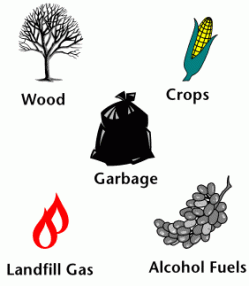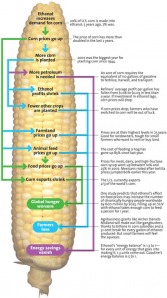Bio-Fuels Explained
Introduction

As the name suggests, bio-fuels are fuels that are shaped when natural breaks down.
The bio-fuels mostly originate from plants and exist in all three kinds of matter:
solid, liquid, and gas.
Distinction between bio-fuels and fossil fuels.
Bio-fuels are unlike fossil fuels in the following ways:
• Fossil fuels take millions of years to build, while bio-fuels can be built particularly, rapidly in a matter of days.
• Bio-fuels are renewable sources of power in contrast to fossil fuels.
• Fossil fuels create large amounts of toxic waste, whereas bio-fuels are fairly safer.
Different Types Of Bio-Fuels

Bio-fuels have been sorted into four forms: first generation, second generation, third generation, and fourth generation.
The first generation bio-fuels are manufactured from vegetable fats, starch, and sugar, which are in order created from food-crops. The first generation fuels are also derivative from animal fats. Biogas, bio-diesel, and sunflower oil are some examples of this variety of bio-fuels.
The second generation of bio-fuels is primarily resultantfrom waste biomass, accordingly resulting in it being a more balanced alternative as opposed to the first-generation bio-fuels. Different kinds of alcohols and diesel made from wood go down into this type of second generation bio-fuels.
The third generation contains bio-fuels resultant from algae. Algae are farmed in a huge amount for generating these bio-fuels. The algae fuels are incredibly environment-friendly seeing as they can simply decay into the soil without harming it.
The bio-fuels in the fourth generation are derivative by a process wherein micro-organisms are raised to work with carbon dioxide to manufacture fuel.
Strengths Of Bio-Fuels

Bio-fuels prove useful in the following ways:
• Bio-fuels minimize the burden on increasingly-disappearing fossil fuels.
• Bio-fuels are environment-friendly. They help lessen carbon emissions into the atmosphere.
• Bio-fuels, mainly bio-diesel, demonstrate to be really cost-effective for consumers.
Negative Aspects Of Bio-Fuels

Bio-fuels are not bereft of criticism.
Though favorable for the environment, bio-fuels have their negative aspects, funnily enough in the ecological range. Bio-fuels have received disapproval for lots of reasons, a number of which are stated below:
• Economists have long argued on the worth of first generation bio-fuels when balanced against the lack of food they cause.
Deriving fuel from crops makes the food crops not fit for for humans. Some people feel that being a bigger priority than fuel, food should not be farmed for producing fuels but for our consumption.
• Generating bio-fuels needs acres of farm land, consequently trespassing upon the natural habitat of vegetation and animals.
Conclusion
Bio-fuels are a great renewable source of energy that is readily available, however some forms of bio-fuels can indirectly harm the lives of plants, animals and even humans.
So, where do we see bio-fuels in the Future Of Electricity then?
Well, nowadays there has been a shift towards wind and solar energy solutions, even domestically. With some simply diy plans, people have already started using these solutions for under $200 and producing their own electricity at home.
They even boast to have reduced their energy bills by up to 80%! If you're ready to go this route, then visit DIY-Renewable-Energy.com - where the best home wind turbine solutions are compared. What's more is they are now letting you Try Earth4Energy For FREE!!
